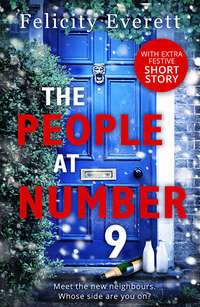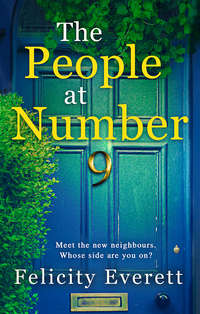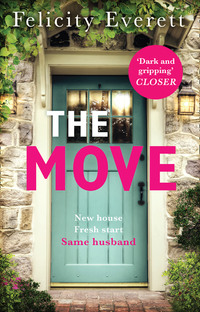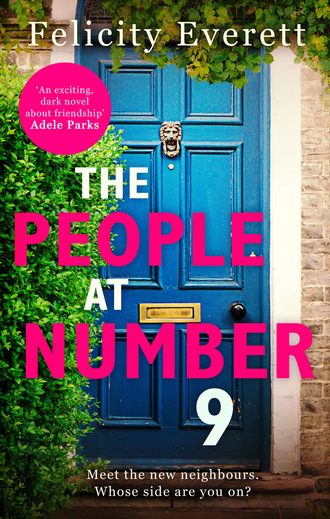
Полная версия
The People at Number 9

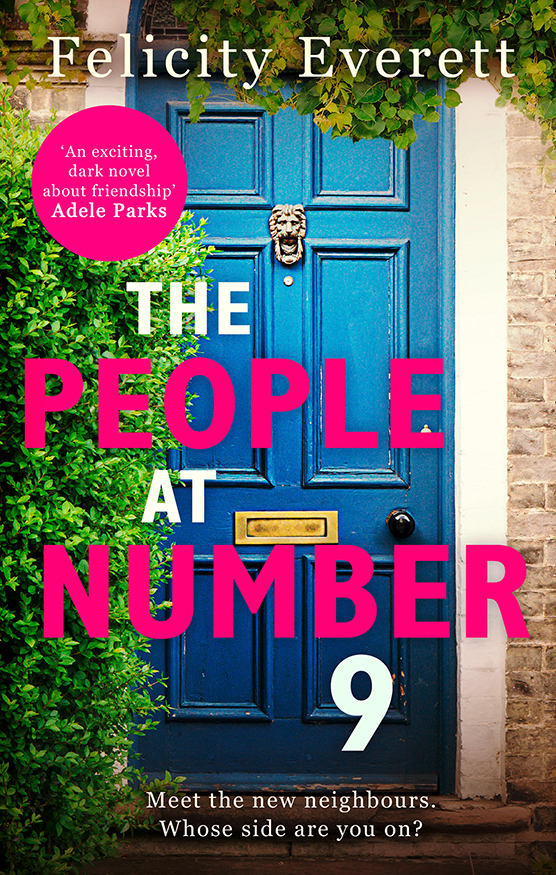
FELICITY EVERETT grew up in Manchester and attended Sussex University. After an early career in children’s publishing and freelance writing, which produced more than twenty-five works of children’s fiction and non-fiction, Felicity’s debut novel The Story of Us was published in 2011. She has just returned from four years in Australia and lives in Gloucestershire.
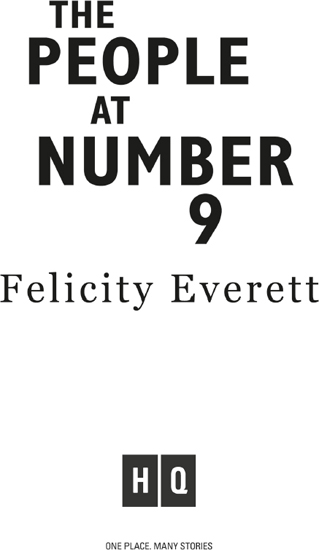
But now I am no longer I,
nor is my house any longer my house.
FEDERICO GARCIA LORCA
Contents
Cover
About the Author
Title Page
Chapter 1
Chapter 2
Chapter 3
Chapter 4
Chapter 5
Chapter 6
Chapter 7
Chapter 8
Chapter 9
Chapter 10
Chapter 11
Chapter 12
Chapter 13
Chapter 14
Chapter 15
Chapter 16
Chapter 17
Chapter 18
Chapter 19
Chapter 20
Chapter 21
Chapter 22
Chapter 23
Chapter 24
Chapter 25
Chapter 26
Chapter 27
Chapter 28
Acknowledgements
Why I wrote The People at Number 9
Reading group questions:
The Move Extract
Copyright
1
Sara’s gaze drifted toward the window. It was dark outside now, and she could see her own reflection superimposed like a hologram on the house across the road. Their curtains were half-closed but the cold blue flicker of the TV could just be seen. She imagined Gavin lounging in the Eames chair with a glass of red, Lou lolling barefoot on the sofa. They might be watching an art-house movie together – or perhaps just slumming it with Saturday night telly. It was all too easy to conjure – the flea-bitten hearth-rug, the aroma of Pinot Noir mingled with woodsmoke. Even after everything that had happened, the scene still had its allure.
From their vantage point, Carol’s place would be a goldfish bowl – blinds open, lights blazing, a room full of people and more arriving. Sara hoped they had noticed. She hoped their exclusion would hurt, but she doubted it. Her focus shifted, once again, to her own face, a ghostly smudge in the sheen of the windowpane.
***
Eighteen months earlier
The first time Sara saw their car, she thought it had been dumped, it looked so incongruous among all the people carriers and Volkswagens. Its rear wheel was perched on the kerb, while its front ones were skewed at an alarming angle. It was a red and grey vintage Humber with a missing hubcap, a slew of rubbish in the passenger footwell and a baby seat in the back. Over the next few days, however, she spotted the car a number of times; not always so erratically parked, but usually within a stone’s throw of her house.
She was standing outside Carol’s, debriefing after the school run, when she noticed her friend’s concentration drift.
“Check out our new neighbour,” Carol murmured, nodding toward the other side of the street.
Sara glanced casually across. Got up in a boiler suit and headscarf, like Rosie the Riveter, the woman was struggling to steer a wheelbarrow of debris down the front path.
“She’s seen us,” murmured Carol. “Smile. Wave.”
Sara did so, regretting the aura she knew they must project, of complacency and cliquiness. The woman acknowledged them with an anxious smile.
Her house was the semi-detached twin of Sara’s. Bay windows, stuccoed porches, steep gables mirrored one another brick for brick and tile for tile, but while Sara’s house exuded bourgeois respectability, number 9 was a mess – peeling paint, rotten window-frames, sagging gutters. Still, they were doing it up now, and as noisy and dirty as the process continued to be, it was to be welcomed. As were the neighbours themselves. On an impulse, Sara left Carol to mind the boys and crossed the road.
“Looks like hard work!” she said, opening the gate. Her neighbour trundled the barrow out onto the street, up a makeshift gangplank and tipped its contents into the skip. She reversed back down and lowered the wheelbarrow to the pavement, before holding both hands out in front of her as if about to play an imaginary piano. It took Sara a moment to realise that she was demonstrating a tremor brought on by the exertion of pushing the barrow.
“Goodness,” said Sara.
“I know!” said her neighbour, then, after wiping her palm clean on her overalls, she held it out.
“I’m Lou.”
“Sara.”
Saah-ra. The syllables seemed to ooze like syrup, speaking of bedtime stories and ballet lessons. Not for the first time, she wished she were called something else.
“And can I just say, I feel terrible,” she added.
“Why?”
“Well, you’ve been here, what, a week…?”
“Two.”
“… And we haven’t been round to say hello. I kept meaning to, but you always seemed so busy.”
She was sounding like a curtain-twitcher now.
“Oh God, it’s me who should apologise. We’ve had our heads up our arses. The building work was meant to be finished before we moved in but,” she shrugged apologetically, “you know how it is.”
“Oh, totally,” Sara said.
“And then, just when we thought things couldn’t get any worse, the art-handlers fucked up and we had to store a million quid’s worth of Gav’s artwork, with half the house hanging off!”
“Gosh,” was all Sara could think of to say.
“Anyway,” Lou made to pick up the barrow again, “we’ll sort something soon…”
“Pop in later if you want,” Sara blurted. “It’s just me and the kids.”
Lou arrived on a waft of expensive, grassy perfume. Her hair was damp and she had changed into an embroidered shirt and jeans. There was something equine about her, Sara thought – a wariness that invited soothing. She had only brought one of the children – an angelic-looking child with shoulder-length, white-blond hair.
“Sara, this is Dash.”
“Hi, Dash,” Sara said, and was treated to a sunny, yet slightly unnerving, smile.
“Patrick! Caleb!” She then called over her shoulder. The trill and clatter of the Xbox continued unabated. Sara turned apologetically to Lou, “Perhaps she should just go through. They’re pretty tame.”
“He,” Lou corrected her.
“Oh!” Sara recoiled in embarrassment, “I thought… the hair.”
“It’s Dashiell,” said Lou, “as in Hammett.”
“Of course. Gosh. I don’t know how I… obviously you’re a boy, Dash. Sorry. It was only because of the…”
“… Hair. Yes, it does confuse some people.”
Lou’s neutrality on the issue, her complete lack of embarrassment or rancour only made Sara feel worse. Her own two children had by now appeared, Patrick, the younger one, skidded to a stop in his socked feet, ahead of Caleb, who followed with the world-weary lope of the pre-adolescent.
“So this is Dashiell,” Sara said, the colour still high in her cheeks. “He lives next door. Dashiell, these are my boys, Caleb and Patrick.”
Sara led Lou to the kitchen. It was the best room. The only room really, that she felt truly reflected her taste. Neil had wanted to economise on the re-fit, but egged on by Carol, Sara had gone all-out, sourcing artisanal tiles to set off the cherry-red Aga and agonising over subtly different shades of sustainable hardwood flooring. She had been vindicated, too. Eighteen months on, the stainless-steel work surface had acquired the odd dent and the cupboard fronts were scuffed, but the room still had a warmth and integrity to it. Even today, with the sink full of dirty dishes and the boys’ lunch boxes spewing rubbish across the table, it looked lived-in rather than squalid. So accustomed had she become to fending off compliments, in fact, that it came as something of a surprise when Lou offered none. Instead her visitor cast an appraising eye around the room before meeting Sara’s, with an inscrutable smile.
“Well,” Sara said, “what can I get you?”
She had been about to list a variety of herbal teas, when Lou shrugged and declared herself equally happy with red or white. They were soon installed at the kitchen table, a bottle of Shiraz nestling among the empty pasta bowls. While Lou knocked back wine like Ribena and enthused about the vibrancy of the neighbourhood, Sara studied her guest’s appearance. She was not quite beautiful. Everything was just a fraction off; the eyes too wide-set, the nose a tad flared. Yet she had managed to make a virtue of these defects – a flick of eyeliner, a discreet silver hoop through one nostril – so that mere beauty no longer seemed the point. Her hair, now almost dry, had resolved itself into a short mop of corkscrew curls, which she thrust around her head as she talked, as if the weight of it irked her.
When their kids hadn’t turned up at Cranmer Road, Sara had assumed they must have sent them to a private school, but Lou told her this wasn’t the case.
“We thought we’d wait for the new school year, rather than pick up the fag end,” she explained. “Where they were before was so tiny, and the curriculum was so different. I say curriculum…” She laughed and shook her head.
“Where was that?” Sara asked.
“Oh, didn’t you know? We were living in Spain. A little village in the mountains, not far from Loja.”
“Sounds idyllic,” said Sara.
“It was,” agreed Lou, with a wistful sigh. “I pine for it, but Dash is starting Year Six in September, so we had a decision to make.”
Sara wondered if they had made the right one. She knew plenty of local parents who, faced with the scramble for places at the mediocre state secondaries in their borough, would have considered a mountain shack staffed by a goat-herd to be a better bet.
“I’d love to live abroad,” she said, “but Neil’s job isn’t very portable…”
“Oh there’s always a reason not to do things.” Lou tugged a tendril of hair in front of her eyes and examined it, before letting it spring back into place. “What you have to do is look for the reasons to do it.”
“That is so true. I’m just a bit of a ditherer, I suppose. It’s such a big leap, isn’t it? And I’d be worried about not fitting in.”
“Mmmm…” said Lou ominously.
“Was that hard, then?”
“Yes and no. They’re very straightforward, the Spanish. If they don’t like you, they tell you to your face and their kids throw stones at your kids.”
Sara clutched her cheeks in mute dismay.
“It’s harsh, I know,” Lou went on, “but it’s kind of preferable to that awful thing the English do of keeping a poker face and making you guess what you’ve done wrong. Anyway, the flipside is, if you can turn it around, you’ve got friends for life.”
“And how do you turn it around?”
“Oh you work hard and you make yourself useful… and you tell your kids to throw stones back.”
“Seriously?”
“Seriously. Stopped overnight,” Lou replied, straight-faced. “And, thank God, because that first winter was hard. You can’t be self-sufficient in a community like that. It’s all tit for tat. You harvest my olives, I’ll fix your generator, sort of thing.”
“How fantastic,” said Sara.
“It is. There really is no better system when it’s working well. Everyone rallies round; there’s a sense of community. You share your surplus produce so there’s no waste.”
“Like a commune.” Sara stared wistfully out of the window at the serried garden fences of their own little enclave, dividing neighbour from neighbour as far as the eye could see. When she looked back, she was astonished to see Lou pressing her middle finger to the bridge of her nose, apparently holding back tears.
“Lou?” she said.
“Sorry.” Lou took a deep, shuddery breath. “I don’t know where that came from.”
Sara maintained a tactful silence, embarrassed, yet also thrilled that Lou seemed about to confide in her.
“We had four-and-a-half blissful years in Riofrio. We made some very, very good friends. People I’d trust with my life.”
“I’m sensing a but…?”
Lou took a gulp of wine and composed herself.
“It was a misunderstanding really. There isn’t a court in Spain that would have ruled in their favour…”
“A court?”
“Oh, it’s nothing terrible, honestly. As I say, a misunderstanding. If we’d had any money, we could have proved it…”
Sara frowned and sat forward in her seat, warming to her role as confidante.
Their neighbours, Dolores and Miguel Fernandez, had a smallholding further down the hill, Lou told her, a few sheep and an orchard. Miguel helped Gavin do the wiring for his studio and she and Gav pitched in at harvest time. So far, so neighbourly, but then the Fernandez decided to farm trout. A bit greedy really, according to Lou, because they were doing just fine as they were. But there were grants available and it looked good on paper.
“Typical Spain – to hell with the integrity of the landscape, bugger the ecosystem – if it ekes out a few more euros, go for it. The irony was,” she hugged herself and looked at the ceiling, blinking back tears, “Gavin helped them build the tanks. Worked flat out, even though he was meant to be getting his exhibition together for the Venice Biennale.”
It had only been up and running a week when they realised it was a disaster, she recalled. The constant whirring of the pumps gave Lou migraines, they didn’t know what to do with all the free trout (God knows they weren’t going to eat it, not the way those pellets smelled). The tanks were an eyesore. But they kept quiet because the Fernandez were their friends and they could see the bigger picture.
“And then one weekend,” she spread her hands wide, like a child, “all the fish died and they said it was Gavin’s fault.”
Sara shook her head.
“I know. Crazy,” said Lou, “but they claimed it was the residue from his studio.”
“Residue?”
“Gypsum, from the plaster of Paris. Of course you don’t know his work, do you?”
Sara shrugged apologetically.
“Well he’s been using it for years. Anyway, he’d hosed down his studio floor, and they claimed it ran down the mountain and contaminated their tanks.”
“Oh dear.”
“Never mind that the farm next door’s using God knows what on their rape. Never mind that Miguel’s an alcoholic and he could have just put the wrong chemicals in. We’re the newcomers, so it’s our fault, right?”
Her hand flexed convulsively on the oilcloth and a single tear brimmed over and tumbled down her cheek. Sara’s throat tightened in sympathy. She reached out to cover Lou’s hand with her own, but somehow suffered a failure of nerve and went instead for the tissue box.
“Thanks,” said Lou, honking noisily into the paper handkerchief. She met Sara’s eye with a brave smile.
“Well,” said Sara briskly, after a brief silence, “I for one am grateful to them.”
Lou looked puzzled.
“To the Fernandezes, or whatever they’re called. If it wasn’t for them and their stupid trout, you wouldn’t be here now, would you? We wouldn’t have you as neighbours.”
“Oh!” Lou gave her a tremulous smile.
The doorbell rang and Sara glanced at the clock.
“Shit!” she said. “Guitar.”
And with that, the spell was broken. Lou was a neighbour she hardly knew, the kitchen looked like a bomb had hit it and Caleb hadn’t practised Cavatina all week. She flew down the hall and let the guitar teacher in, noticing, even as she burbled apologetically to him about the chaos, the flicker of interest he betrayed as he passed Lou in the hall. It was the kind of glance Sara herself never elicited – not sexual exactly, though there was that in it – more a look of recognition. You are of my kind, the look said, or of the kind to which I aspire. And whilst appearing oblivious, Lou nevertheless managed both to acknowledge his need and to remain aloof from it. Sara felt a pang of envy.
Standing on the doorstep, Lou and Sara both started speaking at once.
“I can’t tell you how…”
“I’m really glad you…”
They laughed and Sara deferred to Lou, who shrugged as if suddenly lost for words.
“Thank you,” she said, finally, and they both laughed with relief. Lou had got as far as the garden gate, when she turned back, as if a rash new idea had occurred to her.
“We’re having a few people over on Saturday, a little get-together to christen the house. Why don’t you come?”
2
By the time they had settled the boys and let themselves out of the front door, the street lamps were turning from nascent pink to sodium orange. The Victorian semis loomed tall and narrow in the navy dusk, like nuns having a conflab. The dead hand of gentrification had not yet touched all of them. For every topiaried bay tree, there was a satellite dish, for every tasteful leaded light, a PVC porch. Gav and Lou’s place had yet to declare itself. The skip at the front provided some intriguing clues – an ugly fifties fire surround, a naked shop mannequin – but it was too soon to say for sure what kind of people these were.
“Bloody hell!” hissed Neil, as they stood on Gav and Lou’s doorstep, waiting in vain for someone to hear the bell. “What did you want to bring the Moët for?”
Sara shrugged.
“It’s all we had left.”
She had made a point of opening the last bottle of Sainsbury’s Soave, earlier in the evening, partly to settle her nerves, but mainly to make sure the Moët was all they had left. She knew, if she were honest, that Neil had tucked it at the back of the fridge on the off-chance he might soon have something to celebrate. He was plotting a boardroom coup in the housing association where he worked and he was pretty sure, he had told her over dinner the other night, his grey eyes animated, his jaw churning salad like a cement mixer, that he now had enough people onside to oust the finance director. This would remove the final obstacle between him and the CEO’s job he had long coveted. Sara had looked at him and seen little trace of the humble, idealistic undergraduate with whom she had fallen in love.
If she had told him, back then, that he would be buying Moët to toast his ascendancy to a boardroom, any boardroom, he would have called her a fantasist. Yet here he was, looking every inch the smart casual capitalist in his Paul Smith shirt and Camper shoes. He still had a plausible shtick on why his running Haven Housing would be the tenant-friendly outcome, but it seemed to her that the tenant-friendly outcome was inseparable these days from the Neil-friendly outcome. He had started at Haven wearing jeans and button-down shirts. Gradually, the jeans had gone and a tie had crept in (“tenants like a tie”, he’d said). A brief spell of chinos and sleeveless pullovers had given way to the era of the suit. Suits went down better with “stakeholders”, whoever they were. Scratch the suave surface, though, and you’d find the idealist beneath, still fighting the good fight, still standing up for the underdog. He wasn’t a cynic, her Neil.
She pushed the door, tentatively, and it opened.
“I think we’re just meant to go in,” she said.
It was still unclear whether the event was a soirée or a rave. All day she had kept her ear cocked and her eyes open, but there hadn’t been much to go on. The household had seemed to slumber until well after two, which, for a young family on a summer’s weekend, struck Sara as a significant feat. Then, when most people were beginning to wind down, they suddenly sprang into action. From her vantage point at the kitchen window, she could see Gavin hacking branches off the lime trees at the bottom of the garden with what must have been a blunt saw, because his torso was running with sweat. The temperature had to be in the mid-twenties, and, as it had seemed the whole of that summer, the humidity was high. Their fence was too tall and their shrubs too unkempt to afford anything but the odd glimpse of the kids, but she could hear their excited shrieks and yelps. Music blasted through the open windows – something kitschy and seventies, Supertramp maybe – but, occasionally, Lou would kill the volume and Sara would hear her call out, her tone plaintive, yet with a stridency that somehow managed to penetrate the rasp of the saw.
“Ga-a-av?”
When he had stopped and turned towards her, face glowing, chest heaving, she would ask him some trivial question or other, more to prove her entitlement to do so, it seemed to Sara, than because she really needed to know the answer.
By six o’clock, he was still perched in a cleft of the third and final tree, sawing at a stubborn shred of bark tethering the last substantial branch to its trunk. If it were Neil up the tree, and the two of them were having a “get-together” that night, however impromptu, she knew she’d have been going spare.
She had dithered about a babysitter, and in the end done nothing, because she didn’t really know what the deal was. She’d decided she’d just keep an eye out and when enough guests had arrived, they’d wander round. There was the problem of what to wear, but seeing the way their hosts had gone about things, she reckoned it had to be pretty relaxed. By eight, she was showered, and semi-got-up in her For All Mankind jeans, a silk camisole and strappy sandals, which she’d changed for Birkenstocks, as soon as she saw the look on Neil’s face. She could, she knew, have stared at his Coldplay T-shirt until it burst into flames and he still wouldn’t have got the hint, so in the end she’d just told him as nicely as she could to change it.
The hall was deserted. Tea lights on every step of the uncarpeted stairs threw juddering shadows up the wall.
“Place could go up like a tinderbox,” muttered Neil. The throb of seriously amplified music came from deep within the house. Closer at hand, the hum of party chatter made Sara’s stomach clench with anxiety. She poked her head around the door of the living room; a bearded man in a rumpled linen suit was sitting on a Scandinavian-style leather sofa rolling a joint on an album cover as if it were 1979. What she could see of the room was an odd combination of mess and emptiness. The walls were hung haphazardly with artworks. One alcove was crammed from floor to ceiling with books. In the other, a hydra-headed chrome floorlamp loomed behind a beaten-up Eames chair. Fairy lights were strung through the antlers of a stuffed stag’s head above the fireplace. There was a smell of curry and pot and a faint mustiness, which suggested that the age-old damp problem that had long beset the house had not necessarily been cured. In another corner of the room, she now picked out, amid the gloom, a man in a pork-pie hat and a woman in Rockabilly get-up. They were clutching cans of Red Stripe. She smiled at them tentatively and ducked back out again. She shrugged at Neil.
“Kitchen?”
They blinked as they entered the strip-lit room. It was as busy and vibrant as the living room had been underpopulated and dull. The decibel level alone was intimidating, and for a moment, confronted by what seemed to be an impenetrable wall of bonhomie, Sara’s instinct was to run. These people were not locals – they looked as though they had been flown in from an avant-garde New York gallery. Here were septuagenarians in skinny jeans and twenty-somethings in tweed. Here were Baader Meinhof intellectuals, kohl-eyed It girls, preening dandies and scrofulous punks. Sara felt instinctively for her husband’s hand and steered a course through the mêlée, until she reached safe harbour beside the kitchen table. Neil went to put the Moët down, but Sara gave him a warning look.


